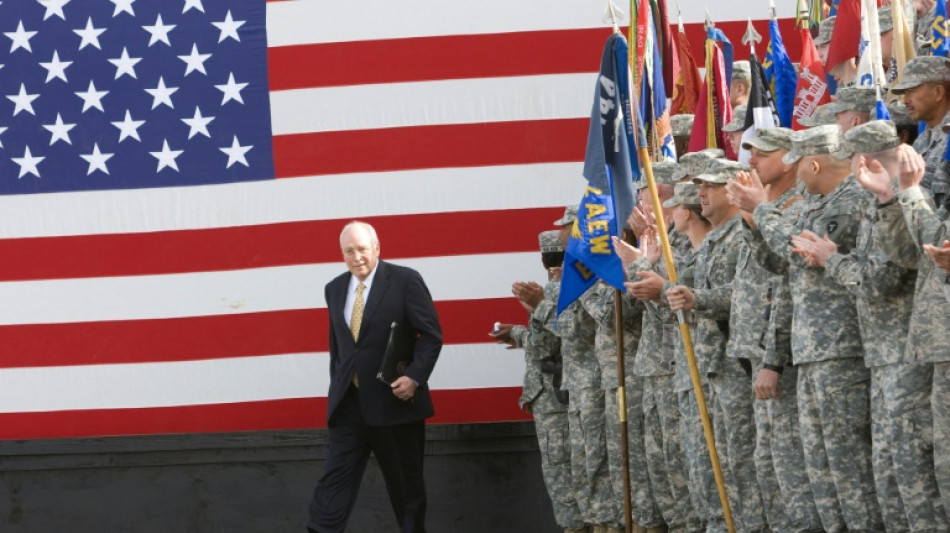
Cheney shaped US like no other VP. Until he didn't.

Dick Cheney achieved influence unrivaled for a vice president in shaping US foreign policy, ruthlessly pursuing military might and advocating pre-emptive war to reshape the world.
The descent of Cheney, who died Tuesday, was also spectacular. His hawkish brand of neoconservatism, including the invasion of Iraq, began to be repudiated even before he left office, and today both major US parties largely reject his views.
With America shellshocked by the September 11, 2001 attack, Cheney -- his grim demeanor accentuated when he spoke from dark bunkers -- advocated a doctrine of pre-emptive strikes, with the United States attacking first before threats materialize, toppling hostile regimes if needed.
Cheney also led the shattering of Western norms on treatment of prisoners, indefinitely jailing terrorism suspects without charges and approving "enhanced interrogation" techniques such as waterboarding that are widely considered torture.
Cheney, a veteran Washington insider with no ambition to be president himself, quickly towered over the less experienced commander-in-chief, George W. Bush.
"It would be hard to argue that he was not the most influential vice president," said Aaron Mannes, a scholar of the American vice presidency who lectures at the University of Maryland School of Public Policy.
Cheney gained clout by focusing narrowly on national security and enabled Bush by "pushing an open door."
"There were a lot of stories of him being a sort of secret president -- the Darth Vader -- running everything. I'm not sure that's true," Mannes said. "It was more a matter of where he put his weight."
- Iraq bloodshed -
The decision to invade Iraq still reverberates across the Middle East and haunts American foreign policy.
Hundreds of thousands of civilians, as well as more than 4,000 US troops, died as the United States toppled Saddam Hussein and the country descended into sectarian bloodshed.
Cheney by the end of his 2001-2009 term began to lose policy debates.
Bush sided with his secretary of state, Condoleezza Rice, and pursued diplomatic options such as talks with North Korea defying Cheney's motto, "We don't negotiate with evil; we defeat it."
Democrat Barack Obama swept to power rejecting Cheney's worldview, offering an outstretched hand to those who "unclench your fist."
Less expected, Cheney's Republican Party shifted direction, as many veterans came home to struggling communities and drug addiction.
Donald Trump last year called Cheney "the King of Endless, Nonsensical Wars, wasting Lives and Trillions of Dollars," though as president he has been eager to exert the swagger of force himself.
In another turn that would have been unthinkable when Cheney was vice president and a hate figure for Democrats, he said he voted for Democrat Kamala Harris last year over Trump.
He joined his daughter, former congresswoman Liz Cheney, who unlike many Republicans has spared no words in criticizing Trump as anti-democratic.
Danielle Pletka, a senior fellow at the conservative American Enterprise Institute who backed the Iraq war, nonetheless said she believed Americans still backed Dick Cheney's idea that a "strong America is a power for good in the world."
"And I don't think Donald Trump would disagree with that characterization of his own stance," she said.
- Never prosecuted -
Obama vowed on taking office that the United States "does not torture" but also decided not to prosecute anyone, hoping to turn the page.
The prison for indefinite detentions on Guantanamo Bay, Cuba -- which Obama wanted to close within a year -- remains open a decade and a half later, although with far fewer inmates.
Sarah Yager, Washington director of Human Rights Watch, which long urged an investigation against Cheney, said the US breaking of norms emboldened other nations to torture.
She also pointed to allegations of mistreatment of migrants sent by Trump to El Salvador.
"There is a direct line from Vice President Cheney to the torture that the US is now complicit in in El Salvador," she said.
"It's really a shame that accountability never closed the door for the United States on torture."
Y.Ko--SG

 London
London

 Manchester
Manchester
 Glasgow
Glasgow
 Dublin
Dublin
 Belfast
Belfast
 Washington
Washington
 Denver
Denver
 Atlanta
Atlanta
 Dallas
Dallas
 Houston Texas
Houston Texas
 New Orleans
New Orleans
 El Paso
El Paso
 Phoenix
Phoenix
 Los Angeles
Los Angeles



